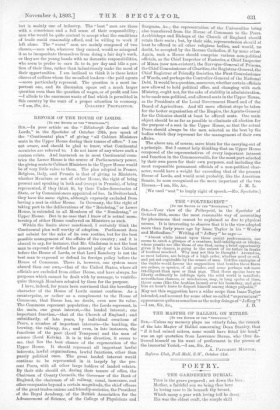REFORM OF THE HOUSE OF LORDS.
[To THE EDITOR OS THE " SPECTATOR:'] SIR,—In your article on the " Edinburgh Review and the Lords," in the Spectator of October 28th, you speak of the " Continental plan " of giving " all Cabinet Ministers seats in the Upper House during their tenure of office." I am not aware, and should be glad to know, what Continental countries are referred to. I do not know of any where such a custom exists. And inasmuch as in most Continental coun- tries the Lower House is the centre of Parliamentary power, the giving seats to Cabinet Ministers in the Upper House would be of very little value to them. The plan adopted in France, Belgium, Italy, and Prussia is that of giving to. Ministers, whether Members or not of either House, the right of being present and speaking in both and (except in Prussia), of being represented, if they think fit, by their. Under-Secretaries of State, or by Commissioners appointed ad hoc. In Switzerland, they have the same rights, although expressly excluded from having a seat in either House. In Germany, the like right of taking part in the deliberations of the "Reichstag," or Lower House, is extended to all Members of the " Bundestag," or Upper House. But in no case that I know of is actual mem- bership of either House conferred on Ministers as such.
Within the limits above mentioned, I certainly think the Continental plan well worthy of adoption. Parliament does not subsist for the sake of its own routine, but for the best possible management of the affairs of the country ; and it is absurd to say, for instance, that Mr. Gladstone is not the best man to expound or defend the general policy of his Cabinet before the House of Lords, or that Lord Rosebery is not the best man to expound or defend its foreign policy before the House of Commons. There is, however, one system more absurd than our own,—that of the United States, where all officials are excluded from either House, and have always, for purposes which cannot be dealt with by message, to ventrilo- quise through Members selected by them for the purpose.
I have, indeed, for years been convinced that the hereditary character of the House of Lords cannot continue. As a counterpoise, or rather as a complement to the House of Commons, that House has, no doubt, even now its value. The Commons represent population ; the Lords represent, in the main, one great interest,—the landed interest; one important function,—that of the Church of England ; and subsidiarily, of late years, by individual creations of Peers, a number of important interests—the banking, the brewing, the railway, &c. ; and even, in late instances, the functions of the poet (Lord Tennyson) and the man of science (Lord Kelvin). It is in this direction, it seems to me, that lies the best chance of the regeneration of the Upper House. It should represent all important lawful interests, lawful organisations, lawful functions, other than purely political ones. The great landed interest would continue to be represented in it largely by the pre- sent Peers, with all other large holders of landed estates. By their side should sit, during their tenure of office, the Chairmen of County Councils, the Governor of the Bank of England, the chairmen of all railway, canal, insurance, and other companies beyond a certain magnitude, the chief officers of the great trades-unions and friendly-societies, the President of the Royal Academy, of the British Association for the Advancement of Science, of the College of Physicians and Surgeons, &c. ; the representation of the Universities being also transferred from the House of Commons to the Peers. Archbishops and Bishops of the Church of England should retain their seats ; bat, by their side, representation should at least be offered to all other religious bodies, and would, no doubt, be accepted by the Roman Catholics, if by none other. Again, such a House should comprise various non-political officials, as the Chief Inspector of Factories, a Chief Inspector of Mines (now non-existent), the Surveyor-General of Prisons, the Chief Commissioner of Charities, the Registrar-General, the Chief Registrar of Friendly Societies, the First Commissioner of Woods, and perhaps the Controller-General of the National Debt. It would be a question, moreover, whether certain officials now allowed to hold political office, and changing with each Ministry, ought not, for the sake of stability in administration, to be made non-political, and allowed seats in the Upper House, as the Presidents of the Local Government Board and of the Board of Agriculture. And till more efficient steps be taken for the better organisation of the Empire, the Agents-General for the Colonies should at least be offered seats. One main object should be as far as possible to eliminate all election for the purpose of a seat in the Upper House, so that the actual Peers should always be the men selected as the best by the bodies which they represent for the management of their own affairs.
The above are, of course, mere hints for the carrying-out of a principle. But I cannot help thinking that an Upper House composed of the representatives of every important interest and function in the Commonwealth, for the most part selected by their own peers for their own purposes, and including the most responsible permanent officials of a non-political char- acter, would have a weight far exceeding that of the present House of Lords, and would most probably, like the American Senate, be soon recognised as the more important of the two [We used "seat" to imply right of speech.—En. Spectator.]




















































 Previous page
Previous page